What Went Wrong For Eliud Kipchoge at the 2023 Boston Marathon?
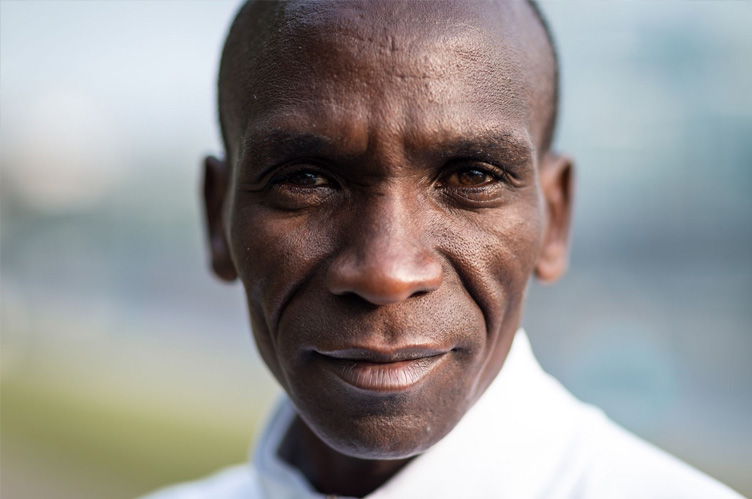
The marathon GOAT was beaten in a marathon for the first time since October 2020
BOSTON – What went wrong for Eliud Kipchoge at the 2023 Boston Marathon? It was the question on the mind of every running fan after the double Olympic champion and world record holder suffered his first defeat in two-and-a-half years,
fading to a 6th-place finish in 2:09:23 after leading almost every step of the opening half.
Kipchoge remained with the leaders through 18 miles but had no answer to the surge thrown in by Tanzania’s Gabriel Geay midway through the Newton Hills and would wind up more than three minutes behind winner Evans Chebet (2:05:54).
Kipchoge did not speak to the media after the race on Monday, instead releasing the following statement: I live for the moments where I get to challenge the limits. It’s never guaranteed, it’s never easy. Today was a tough day for me. I pushed myself as hard as I could but sometimes, we must accept that today wasn’t the day to push the barrier to a greater height. I want to congratulate my competitors and thank everyone in Boston and from home for the incredible support I am so humbled to receive. In sports, you win and you lose and there is always tomorrow to set a new challenge. Excited for what’s ahead.
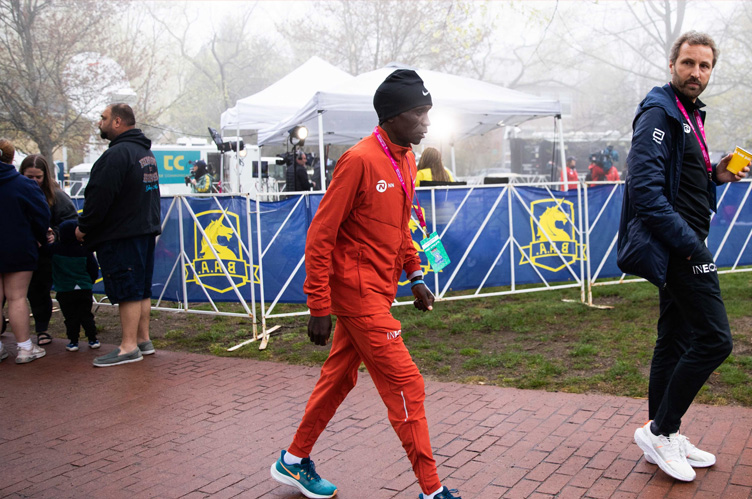 From that statement, it’s impossible to say whether Kipchoge battled any specific issues during the race.
From that statement, it’s impossible to say whether Kipchoge battled any specific issues during the race.
But Kipchoge and his coach Patrick Sang said his buildup was strong and did not mention any problems prior to the race or in the statement above. It appears Kipchoge was outraced today, simple as that.
Did he underestimate the course?
Throughout race week and in the early miles of today’s race, Eliud Kipchoge made it very clear that he was not treating Boston any differently from his other World Marathon Major appearances. He did not alter his training to account for Boston’s uphills and downhills, trusting that his usual training on the hills around Kaptagat would be sufficient.
He did not run on the course before race day (though this is not uncommon for elite athletes), and said he did not ask anyone for advice about how to handle it. Then once the gun fired, he went out super hard (14:17 for the first 5k) and made sure he was the one to lead almost every step of the first half of the race.
Kipchoge’s general approach could be distilled to this:
I am the best marathoner in history and I am going to do exactly what I usually do, and that will be good enough to win. It wasn’t necessarily a bad approach. He has won more big races than any marathoner in history. But in many ways, Kipchoge ran like the Boston rookie he was.
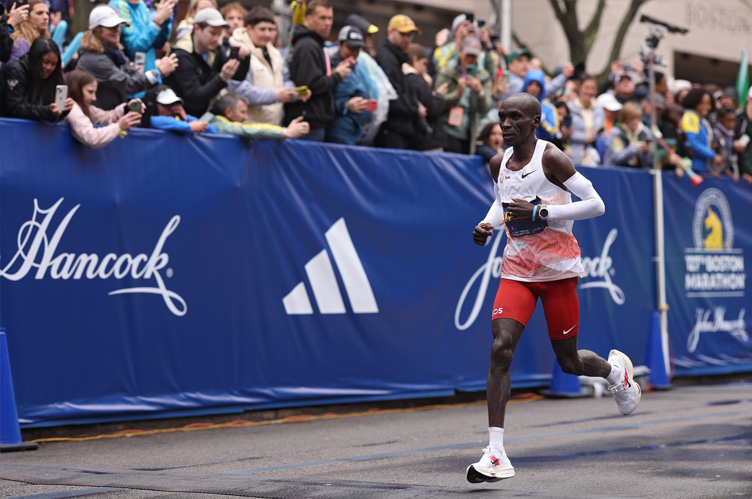
He crushed the downhill segments of the course (he also ran the 16th mile in 4:23) and wound up running a huge positive split (62:19/67:04), with nothing in his legs for the final miles.
He also spent a lot of time in the front, and while that’s not an unfamiliar place for Kipchoge, that costs energy, both physical (he had to take the brunt of a mild but not insignificant headwind) and mental (with no pacemakers, you can’t turn your brain off in the early miles).
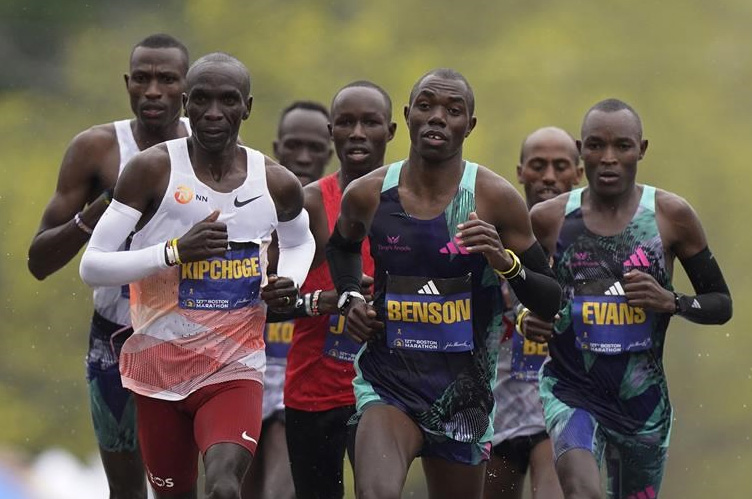 Finally, it’s worth noting that the weather was similar during Kipchoge’s last marathon loss
Finally, it’s worth noting that the weather was similar during Kipchoge’s last marathon loss
(the temperature was nearly-identical, though the rain was much stronger in London).
Kipchoge has won in wet conditions before — at the 2016 Olympics and 2017 Berlin — but it wasn’t as cold as today
(it was in the 70s at the start in Rio and 57 in Berlin).
 Would a more conservative approach have helped?
Would a more conservative approach have helped?
Did any of that cost Kipchoge the win today?
Did any of that cost Kipchoge the win today? There’s no way to say definitively, but he likely would have been better served treating this race as he did his Olympic marathons, where the opening splits were a modest
65:55 (Rio) and 65:13 (Sapporo) before Kipchoge attacked late in the race (granted those marathons both came in warmer weather). Kipchoge spent large portions of those races near the front but wasn’t as concerned with being absolutely front and center the entire time and was not pushing the pace into a headwind.
At the very least, there was no need for Kipchoge to be blocking the wind for as long as he did.
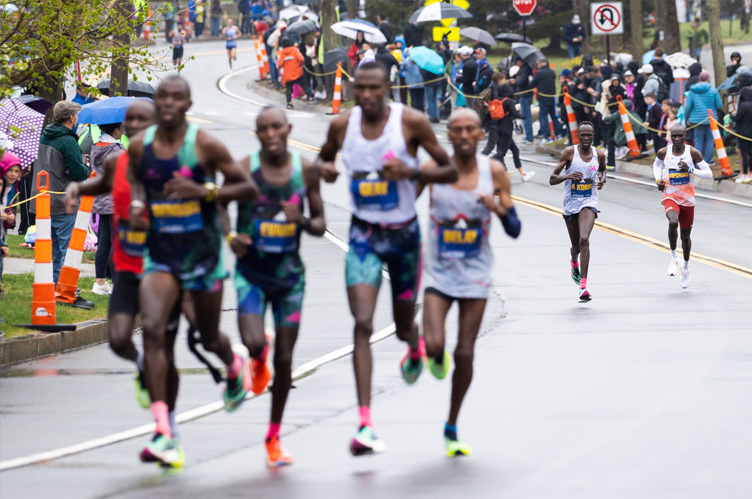 The lead pack was wide, meaning Kipchoge was not the only one facing the wind, but he took more of it than anyone else — certainly more than Chebet, who did a terrific job tucking in and conserving energy in the early stages.
The lead pack was wide, meaning Kipchoge was not the only one facing the wind, but he took more of it than anyone else — certainly more than Chebet, who did a terrific job tucking in and conserving energy in the early stages.
Nike and INEOS showed the very clear benefits of drafting during Kipchoge’s two sub-2:00 attempts yet Kipchoge apparently forgot those lessons today in Boston.
But maybe there’s no scenario where Kipchoge won this race. Maybe he’s just a little bit older and finally starting to decline slightly (though he did set the world record in his last race).
Maybe he’s just not made for a course like this, with its ups and downs and variable surging that makes it so different from London, Berlin, and Tokyo.
Or maybe he just had a bad day. It happens to marathoners all the time — just not usually to Kipchoge.
 Where does Kipchoge go from here?
Where does Kipchoge go from here?
Kipchoge has lost marathons before and bounced back just fine. After he lost his first race in Berlin in 2013, he won his next 10 marathons. After his second defeat in London in 2020, he won his next four. It could be, at 38 and after 10 years of dominance, that Kipchoge is finally starting to slow down. Or he could rip off three more wins after this and another Olympic title in Paris. Time will tell.
It is going to be intriguing to see where Kipchoge goes from here, though.
He has long said his desire is to win all six World Marathon Majors, which would make New York – the only fall major he hasn’t won – a natural choice for his next race. But there have been rumblings this week in Boston (unconfirmed) that the Sydney Marathon – which is pushing for World Marathon Major membership – is making a big effort to sign Kipchoge for its race in September.
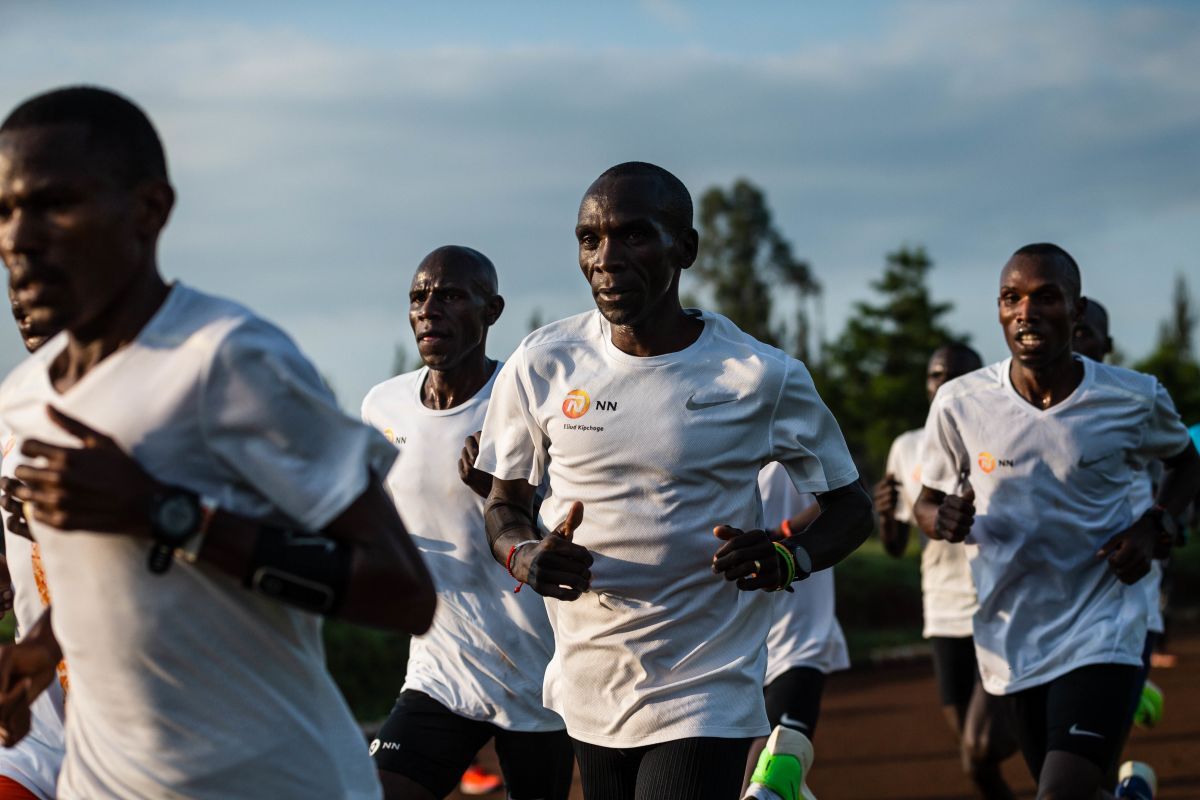 So does Kipchoge head to New York, even after his struggles today in Boston (the course that most closely mimics NY’s hills and bridges)?
So does Kipchoge head to New York, even after his struggles today in Boston (the course that most closely mimics NY’s hills and bridges)?
Will he go to Sydney? Or elsewhere?
Beyond that, how serious is he about this grand slam quest to win all the majors?
Will he be back in Boston in 2024 to give it another go, or will he return to London next spring – a more familiar and successful course for Kipcho
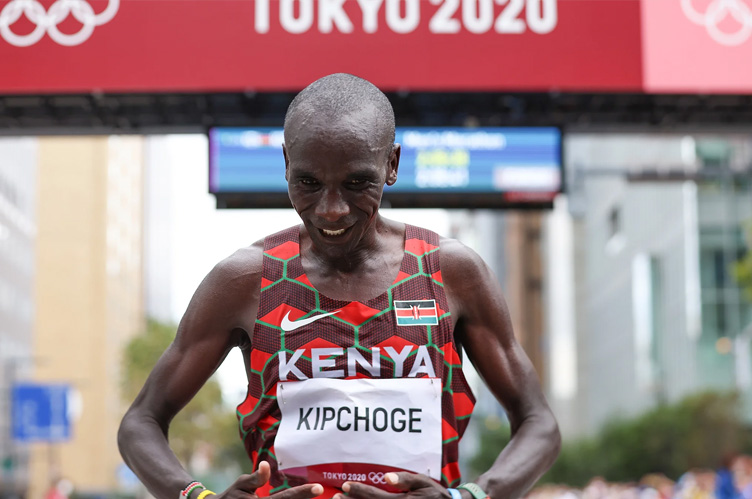 These decisions could have major consequences on Kipchoge’s quest for a third Olympic gold medal in 2024. Kipchoge has enough credit in the bank that he’d likely be on the Olympic team with a win at any 2024 spring marathon.
These decisions could have major consequences on Kipchoge’s quest for a third Olympic gold medal in 2024. Kipchoge has enough credit in the bank that he’d likely be on the Olympic team with a win at any 2024 spring marathon.
But if he returns to Boston next year and is beaten, there’s no guarantee Athletics Kenya would send him to Paris – remember that they left Mary Keitany off the 2016 Olympic team after she was 9th in London that spring.
Kipchoge has long said he only chases one rabbit at a time – he doesn’t think about anything beyond the marathon he is training for.
He chased the Boston rabbit and failed to catch it. Which rabbit will he chase next?
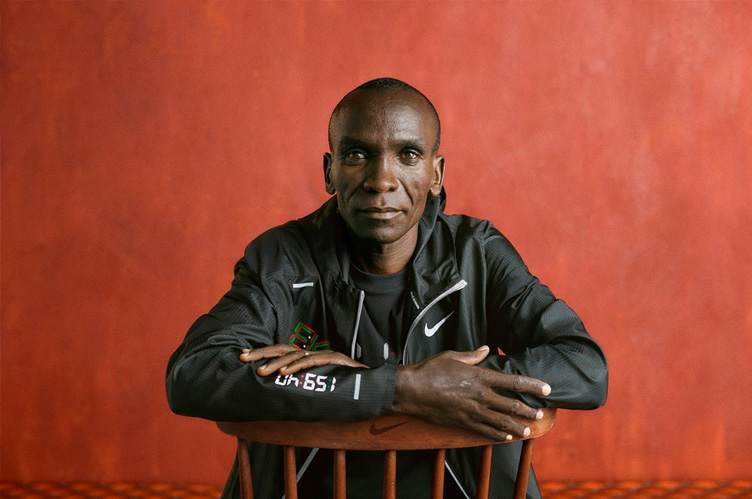
Kipchoge should have spoken to the media after the race
نکته آخر: این یک حرکت فوقالعاده ضعیف از سوی کیپچوگه بود که بعد از مسابقه با رسانهها صحبت نکرد. چیزی که به سادگی در یک ورزش حرفهای بزرگ مانند NFL یا NBA از آن نمیتوان فرار کرد.
او برای شرکت در این مسابقه پول کمی دریافت کرد و حضورش بیوقفه تبلیغ شد. مگر اینکه نوعی اورژانس پزشکی وجود میداشت – و هیچ نشانهای مبنی بر این نیست – این میانمایگیست که کیپچوگه روز دوشنبه در دسترس نبود.

though the B.A.A. said he will be at Tuesday’s champions’ press conference to take questions. The World Marathon Majors should make it a requirement that, barring a severe medical issue, their stars must talk to the media immediately after the race or they lose a chunk of their appearance fee. Fans are excited when big stars like Kipchoge run the marathon and deserve to hear from them, win or lose.
Cr: letsrun.com


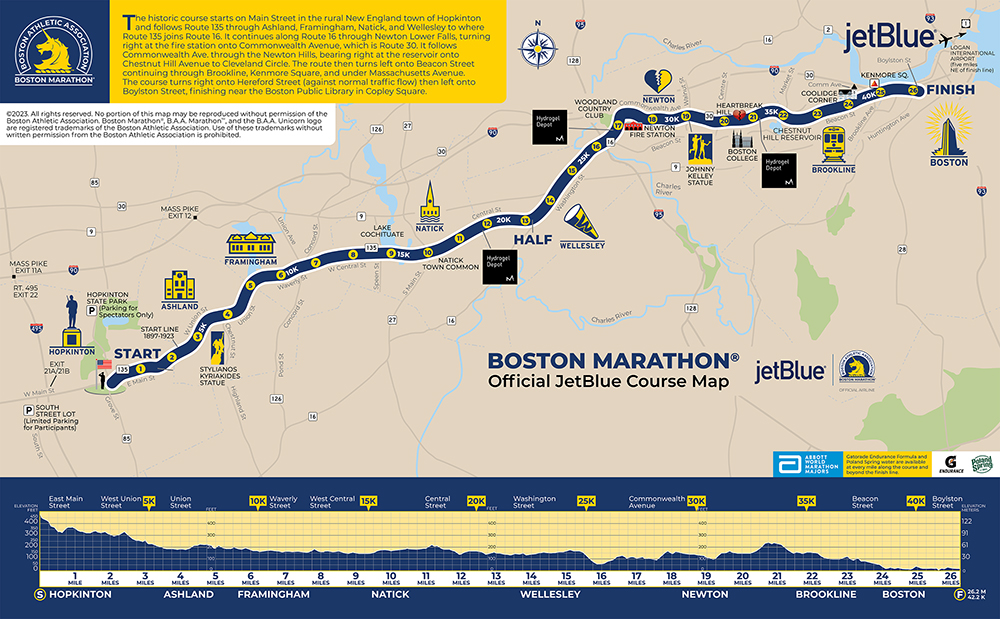


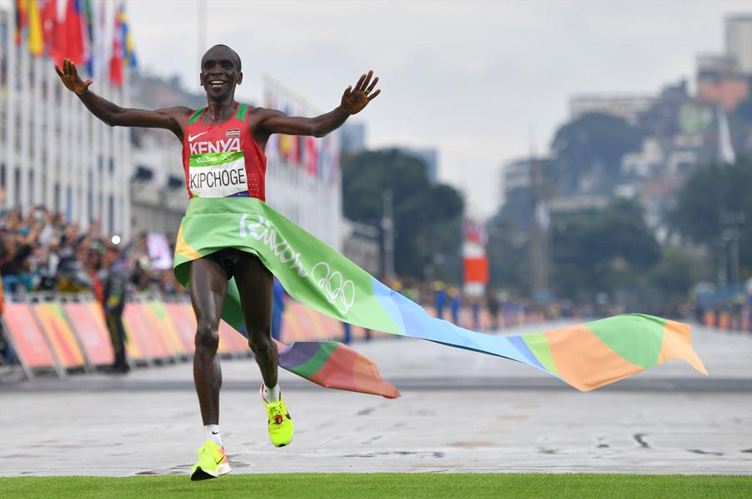 Would a more conservative approach have helped?
Would a more conservative approach have helped?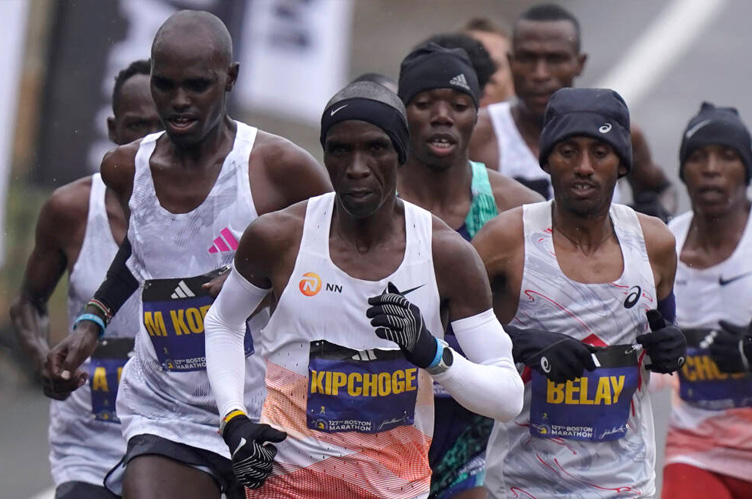 Where does Kipchoge go from here?
Where does Kipchoge go from here?